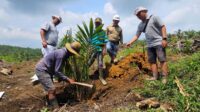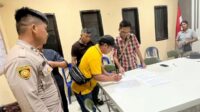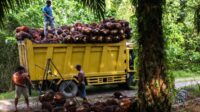PALMOILMAGAZINE, JAKARTA — On September 19, 2025, President Prabowo issued Government Regulation (GR) No. 45 of 2025, amending GR No. 24 of 2021. The new regulation focuses on the imposition of fines for business operators operating without permits within forest areas.
A key highlight of the amendment is the expanded role and authority of the Forest Area Enforcement Task Force (Satgas PKH), which was previously governed only under Presidential Regulation No. 5 of 2025. The latest regulation elevates Satgas PKH to a “superbody” with powers equivalent to those of the Minister of Forestry in enforcing compliance and handling illegal oil palm plantations located within forest areas.
Under the earlier GR No. 24 of 2021, all decisions regarding the identification of unlicensed plantation operators, field data validation, fine calculations, enforcement actions, and asset seizures were exclusively under the Ministry of Forestry’s jurisdiction. However, GR No. 45 of 2025 makes this authority optional rather than absolute.
Also Read:
This shift is reflected in several revised articles. For instance, Article 6(1) now reads: “The inventory of data and information on business activities established within forest areas without forestry permits shall be conducted by the Minister of Forestry and/or the Forest Area Enforcement Task Force.”
The repeated use of the phrase “and/or” throughout the regulation signals a significant dilution of the Ministry’s powers, suggesting that the Satgas PKH may now effectively override or bypass ministerial authority in enforcing plantation compliance.
This raises a critical public question: why has President Prabowo granted such broad authority to a task force largely composed of military personnel? Was this move driven by an assessment that the Forestry Ministry has been ineffective in enforcing regulations, or is it part of a broader agenda to give the military a greater role in non-combat state functions?
Mounting Pressure on Palm Oil Operators
Another controversial aspect of GR No. 45 of 2025 concerns the new formula for calculating administrative fines on oil palm businesses operating within forest areas. The previous regulation (GR No. 24/2021) included forest cover density as a variable in determining fines. This has been removed in GR No. 45/2025, which now sets a fixed value of IDR 25 million per hectare per year as the base for calculating penalties.
This change has sparked anxiety among plantation operators, including smallholders located in or near forest zones, as roughly 25,863 villages could potentially be affected by Satgas PKH’s enforcement activities.
Adding to business uncertainty, the revised regulation eliminates clauses that previously allowed companies to apply for post-payment permits after settling their fines. Now, each operator will be fined based on formulas detailed in the regulation’s annex, with Satgas PKH responsible for the collection process.
If fines remain unpaid within 30 days of issuance, Satgas PKH will initiate asset seizures, freeze financial access, and impose travel bans on the violators before auctioning the seized assets to recover the owed amounts. Even if the fines are fully paid, the plantations will still be repossessed by the state, with their management transferred to the state-owned enterprise PT Agrinas Palma Nusantara.
This fundamental policy shift means plantation operators lose the right to reclaim or continue managing their lands—even after paying fines. The situation is especially harsh for companies that originally operated legally but were later affected by changes in land-use zoning that reclassified their areas as forest land.
Lack of Protection for Local Communities
Although GR No. 45 of 2025 retains provisions from GR No. 24 of 2021 regarding smallholder activities within and around forest areas, in practice Satgas PKH has often treated smallholder plots the same as corporate plantations.
Yet Articles 41 and 42 clearly provide exceptions for community farmers—those who have lived in or near forest areas for at least five consecutive years and manage no more than five hectares of land.
If President Prabowo truly seeks to uphold rural community interests, there should also be a dedicated task force to accelerate social forestry programs, agrarian reform, and land reclassification processes as outlined in Article 42 of the original regulation.
The absence of strong government support to resolve community oil palm issues within forest zones is seen as a major setback for the administration—especially given Prabowo’s repeated commitments to uphold Article 33 of the 1945 Constitution. Many now hope that parliament will step in to ensure policies remain aligned with the people’s interests.
By: Ahmad Zazali, SH., MH.
Managing Partner, AZ Law Office & Conflict Resolution Center
Chairman, Center for Law and Conflict Resolution (PURAKA)
Disclaimer: The views expressed in this article are solely those of the author and do not reflect the position of beige-heron-208544.hostingersite.com.




































